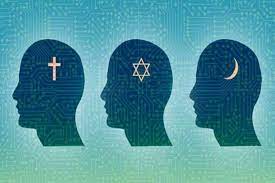Beliefs, religions have arisen as a result of trying to understand how humanity exists or how the world was formed. One of the biggest reasons for the formation of religions is that man is in search of a creator. Humanity, which wants to give meaning to its arrival and life in this world, has always needed a creator because it is not easy to understand the perfect structure of the universe and the world. That is why people want to believe that a sacred being exists and that he created the universe.
This has been the case for many years, people have started to worship fire first, then the sun and then the moon. Later, they came to the conclusion that God sees us not only during the day or only at night, but always from the point of view that God is an abstract being that we cannot see him. In other words, the search for god has been in all periods of humanity in short, but God has always remained a metaphysical being. Religion does not enslave people, on the contrary, religion frees the believer more. If a believing person does not enslave himself, if he can question and investigate his faith, and if he lives by investigating the truths of his faith, the believing person does not enslave his beliefs. Business makes a person who does not believe so enslaved.

It is seen that the kur’an is brought before people with a discourse that opposes the enslaving corporate order. The ”demand for freedom” and the fight against hunger have been the main themes of the first descending surahs. It is not surprising that eliminating the class of slaves created from people who were enslaved against their will and completed their lives without ever achieving minimum living standards and emancipating people is the first priority of the kur’an. To give an example from the Islamic religion, it is a sin for a believing person to drink, but in return for him to expect freedom in the hereafter, it gives him great freedom in this life for a believing person because he knows that it will be useful to him in the hereafter. For a person who does not believe, the situation is the opposite, but this will not affect him much, since he does not already believe.
It is necessary to explain with a simple example that in order to raise elephants in India, they are tied to a stake with a thick chain when they are small. Of course, it is not possible for the baby elephant to unscrew this stake or break the chain. The little elephant struggles with all his might to get rid of this chain, but he can’t change the result, he can’t get his freedom. Years pass, and the elephant grows up. He can afford dozens of times the stake he is tied to, but the elephant will never make such an attempt. Because he believed that he could not be free. What is no longer broken is not the elephant’s chain, but his belief that he cannot be free. That is, in fact, beliefs do not enslave or emancipate anyone. Beliefs liberate people who believe in the religion they believe in, while enslaving people who don’t believe. When we look at it, beliefs do not liberate anyone, but they also do not enslave believers.
